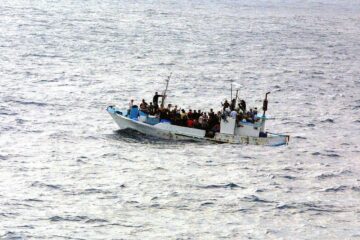![]()
Introduction:
The term “Self-determination” refers to “the right claimed by a people to control their destiny”. The United Nations General Assembly Resolution mentions that: All peoples have the right to self-determination; by virtue of that right they may freely determine their political status and freely pursue their economic, social and cultural development. The United Nations Charter’s norms states that people with no interference, according to the principle of equal rights and fair equality of opportunity have the right to choose their sovereignty and international political status. In the 1860s concept was introduced first. Vladimir Lenin, former Premier of the Soviet Union and Woodrow Wilson, President of the United States, encouraged this principle during and after World War I. This principle was included in the Atlantic Charter, during World War II, which was declared on 14th August 1941 by Prime Minister of the United Kingdom, Winston Churchill who pledged the 8 principal points of the Charter and President of the United States of America, Franklin Roosevelt. Self-determination refers to the free choice of one’s own acts without external compulsion. This concept is as old as the concept of statehood. Statehood is the status of being a sovereign state or nation. Only statehood could bestow international legal personality and its accompanying rights as well as duties upon any group. Unfortunately, there is no definition of statehood in international law. The norms for statehood given by the Convention on rights and Duties of States require;
- A permanent population;
- A defined territory;
- Government;
The capacity to enter into relations with other states.
This raises the concern about the right of self-determination of various cultural, legal and indigenous groups.
The Declaration of Independence of the USA on 4th July 1776, declared that the governments derived their power’s from the consent of the governed. Any applicant for the membership of the United Nations in general terms should be a “state”. A sovereign state can exist without being recognised by other sovereign states, according to the declarative theory of statehood. Those which are unrecognised states will have the difficulty in practising full treaty-making powers or engage in diplomatic relations with other independent states. When an individual has realized his right to self-determination when he establishes a sovereign state and freely associates with the other state or may have freely integrated with another state after expressing their will to do so, therefore following is the criteria of the Right of Self-determination.
History
The term Self-determination was used for the first time by the United States President Woodrow Wilson in 1918. This principle was professed to be the basis of the Versailles peace Settlement in 1919. The idea that the people are independent and are not the subjects of the state is developed through the French, English and American revolutions. In the 1770s the American Revolution was seen as the first declaration of the right of natural and democratic self-determination, due to the clear mention of natural law and the natural rights of man as well as the consent of and sovereignty by the people governed; inspired by the enlightened writings of John Locke. When the Bolsheviks came into power in Russia in October Revolution and called for Russia’s withdrawal as a member of the Allies of World War I. It also supported the right of all nations also that of the colonies to self-determination. The principle of self-determination did not extend to end colonialism. French Revolution too legitimized the idea of Self-determination. Mainly during the 1920s as well as 1930’s some successful movements regarding self-determination in the beginnings of the process of decolonization. Canada, New Zealand, Newfoundland, the Irish Free State, Commonwealth of Australia and the Union of South Africa was granted independence by the United Kingdom under the Statute of Westminster after declared by the British Parliament that it was incapable of passing laws over them without their consent. Indian Independence was considered to be unsuccessful. In 1941 Allies of World War II accepted the principle of Self-determination and declared the Atlantic Charter. Twenty-Six nation-states on January 1942 signed the Declaration by United Nations. After the sanction of the United Nations Charter in 1945 by the end of World War II put forward the right of self-determination into the framework of diplomacy and international law. According to Chapter 1, Article 1, part 2 states the main purpose of the UN Charter- “ to develop friendly relations among nations based on respect for the principle of equal rights and self-determination of peoples and to take other appropriate measures to strengthen universal peace.” The United Nations General Assembly Resolution 1514(XV) on 14th December 1960, adopted the “Declaration on the Granting of Independence to Colonial Countries and Peoples” that supported the granting of independence to colonial countries by providing an unavoidable legal linkage between self-determination and its goal of decolonisation. Justified by the principle of self-determination, almost between 1946 and 1960, 37 new nations in Asia, Africa and the Middle East gained independence from the colonial powers.
International Perspective
The Convention which codifies the declarative theory of statehood, the Montevideo Convention on the Rights and Duties of States is a treaty that was signed at Montevideo in Uruguay on 26th December 1933, during the Seventh International Conference of American States. The United Nations Charter mentions two meanings of the term self-determination. Firstly, a state is said to have the right of Self-determination having the freedom and right to choose its political, social, economic and cultural systems. Secondly, the right of self-determination is also defined as the right of people to establish itself in a state of freely determine the form of its association with an existing state ( Article 1, Paragraph 2; and Article 55, Paragraph 1). Article I of the Charter of the United Nations explains the principle of self-determination. This principle was first incorporated under the Atlantic Charter of 1941and also the Dumbarton Oaks proposals which later evolved into United Nations Charter.
Present Scenario
In 2000 United Millennium Declaration failed to handle these news demands, which mentioned only “the right to self-determination of peoples which remain under colonial domination and foreign occupation.” Macquarie University Law Journal an issue where Associate Professor Aleksandar Pavkovic and Senior Lecturer Peter Radan outlined current legal and political issues in self-determination. Which include defining ‘people’; If the people are united in their desire for self-determination, it strengthens their claim. There is no exact definition of peoples often the reference is made to the definition by United Nations Special Rapporteur Martinez Cobo in his study on discrimination against indigenous populations. The criteria for the definition of people having the right of self-determination which was suggested during the Kosovo case decision in the year 2010 in the International Court of Justice- ethnicity, traditions and culture, historical ties and heritage, language, religion, sense of identity or kinship, common suffering and the will to constitute a people. In deciding international borders between sovereign states, self-determination has allowed a number of other principles. National self-determination appears to be a challenge to the principle of territorial integrity of states as the will of the people makes a state legitimate. People should be given the freedom to choose their state as well as territorial boundaries. According to the UN and the International Law experts and the International Court of Justice, there is no difference between the principles of self-determination as well as territorial integrity. Self-determination takes precedence.
Notable Events
1) The Republic of Artsakh in the Caucasus region on 2nd September 1991 declared itself as independent on the basis of self-determination. In the consequent war with Azerbaijan, defended its independence but remains unrecognised by United Nations states.
2) In relation to Aboriginal Australians and Torres Strait Islanders in Australia the topic of self-determination is a topic of debate. Under the Outstation movement, Aboriginal requested the right to administer their own remote communities as part of the Homelands movement.
3)The modern borders of Mali, Niger and Algeria which is considered to be a traditional homeland for the Tuareg people. Numerous rebellions occurred but in the year 2012, the Tuaregs people triumphed in occupying their homeland Azawad and declared it independent. Later their movement was hijacked by the Islamist terrorist group Ansar Dine.
4) The War fought between the Nigerian central government and Biafran secessionists of the Republic of Biafra is called the Nigerian Civil War. The primitive people of Biafra have been agitating for independence to revive their country. A human rights organization called Bilie Human Rights Initiative have been registered by them which is an initiative in Nigeria as well as in the United Nations to advocate for their right of self-determination and also to achieve independence by the rule of law.
5)Since the formation of India and Pakistan in 1947 the legal state of Jammu and Kashmir which is between India and Pakistan has been debated as Britain was giving up their rule over India and Pakistan. The ruler of Kashmir at the time of accession, Maharaja Hari Singh, signed the Instrument of Accession Act on 26th October 1947as the Pakistani tribesmen attacked his territory. And this allowed Jammu and Kashmir to accede to India. The Last Viceroy of British India, Lord Mountbatten stated that a referendum was needed to be held by the citizens in Pakistan, India and Kashmir so they could vote as to where Kashmir should accede. But the following never took place. In the year 1948, the United Nations intervened and commanded a plebiscite to be taken to know the opinions of the Kashmiris if they want to accede to India or Pakistan. This plebiscite left out the right for Kashmiris to become an autonomous state and have the right of self-determination. Till today Kashmiris face various human rights violations committed by both India and Pakistan and is yet to gain complete autonomy which they are seeking through self-determination.
Conclusion
We can see that the concept of the right of self-determination has been through a lot of political turbulence. After World War II, decolonisation limited the application of the right of self-determination and could not be considered as absolute. Various international Charters and organisations have included the right to self-determination. Self-determination does not automatically result in independence and succession. Also the rights of the minority groups to self-determination which is less established than that of indigenous groups.



0 Comments